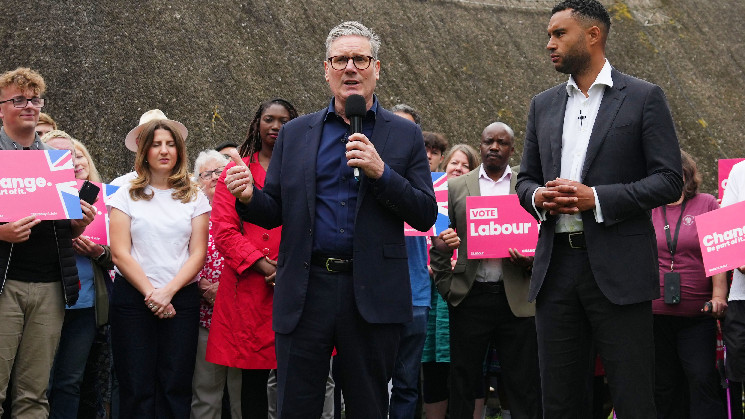The Labour Party is leading the polls, with 42% of voters expressing support, while the Conservatives have 19% according to a June Ipsos poll on voting intentions.
Most leading parties have not mentioned crypto in their election manifestos.
The Labour Party, the favorite to win tomorrow’s U.K. general election, has barely mentioned crypto during its campaign, leaving the future of the industry in the country up in the air.
Other than a few words on wanting the country to be a tokenization hub and support digital pound plans, the party has been tight-lipped about crypto.
The topic did not come up during the last debate between Prime Minister Rishi Sunak and Labour’s Keir Starmer, which was dominated by welfare, immigration and the relationship with the European Union. While the Conservative government pushed a number of crypto-forward policies, its current manifesto – like those of Labour and the Liberal Democrats – makes no mention of it.
Labour leads in the polls with 42% of voters expressing support. The Conservatives have 19%, according to a June Ipsos survey on voting intentions. When the seats are counted, Starmer is likely to be prime minister with a large majority in Parliament.
The party’s manifesto “referenced a kind of pro-competition environment,” said Laura Navaratnam, U.K. policy lead at the Crypto Council for Innovation, an industry group. “It talked about the role of regulators, but all in a broader context. So still, nothing on crypto. But on the plus side, they haven’t said anything negative either.”
Instead, the Labour manifesto focuses on economic growth, with plans to invest billions into building supply chains, adding more neighborhood police and cutting waiting times for the National Health Service.
Party representatives did not return CoinDesk’s request for comment.
Read more: Labour Wants UK to Be a Securities Tokenization Hub and Advance Digital Pound Work
Not trendy
Roughly half the world’s population will vote in general elections this year. In most of the more than 60 nations going to the polls, including South Africa, Croatia, Finland, Lithuania and France, crypto has barely been an issue.
The main exception is the U.S., where Republican presidential candidate Donald Trump has brought up crypto issues, though crypto was not addressed in the first presidential debate.
“Looking at all of the manifestos in aggregate, no one mentioned crypto,” said Jordan Wain, U.K. policy lead at Chainalysis, of the British parties’ plans. “But that kind of makes sense because manifestos are written for the electorate. They are written to show potential voters what that party thinks about wedge issues primarily.”
Health care, national security, crime and the economy are the chief battleground issues, he said.
Say something
Still, crypto industry participants hope the major parties will keep the issue in mind.
George McDonaugh, the co-founder and co-managing director of investment firm KR1, said in a statement that he believes the crypto industry will help “foster growth and jobs.”
Eleanor Gaywood, head of strategy at Coincover, a protection firm, said it was “encouraging” that both Labour and Conservative supported innovation, but said concrete details are necessary. “After the election, it will take time to gauge the next government’s stance on crypto.”
The U.K. was expected to pass legislation to allow the Financial Conduct Authority to regulate stablecoins alongside staking rules. That didn’t happen because Sunak called the election earlier than many anticipated.
Those rules are still needed, as are market abuse rules, Wain said. Guidance on the U.K. ‘s promotion rules is also needed, Navaratnam wrote in an opinion piece. Currently the regulators oversee crypto using the existing anti-money laundering registration regime and promotion rules, but the country needs more, crypto advocates have said.
Read more: U.K.’s Next Government Must Act Fast to Regulate (and Retain) Crypto Firms
It’s a question of when will it happen?
The Conservatives have said they wanted the country to be a crypto hub, and last year passed legislation to help regulate the industry as well as measures to make seizing crypto easier in criminal cases. The Treasury Department consulted on how it wanted to regulate crypto and suggested a phased approach that starts with stablecoin legislation.
A Labour government won’t necessarily put a halt to the country’s crypto ambitions, Navaratnam said.
“So one would hope that [stablecoin legislation] is a fairly uncontroversial piece of legislation, which is already off the back of something fairly big, i.e. the amendments to the Financial Services and Markets Act, would be allowed to carry on in which case we would hope that we will see something in the autumn,” Navaratnam said.
Chainalysis’ Wain said he believes that a lot of the work that has been done by regulators won’t just be swept under the rug.
“A lot of the really important work has been done and it’s not been done by the party’s themselves, it’s been done by government departments, It’s been done by the FCA, they’re the ones that are formulating legislation,” he said. “Whichever party comes in regardless of how quiet or how loud they’ve been they are not going to sweep all of that hard work off the table, it’s not going anywhere.”
The FCA declined to comment.
Read more: UK Sets July 4 Date for Election Likely to Oust Conservative Party, Spelling Uncertainty for Crypto Hub Plans
Read the full article here

